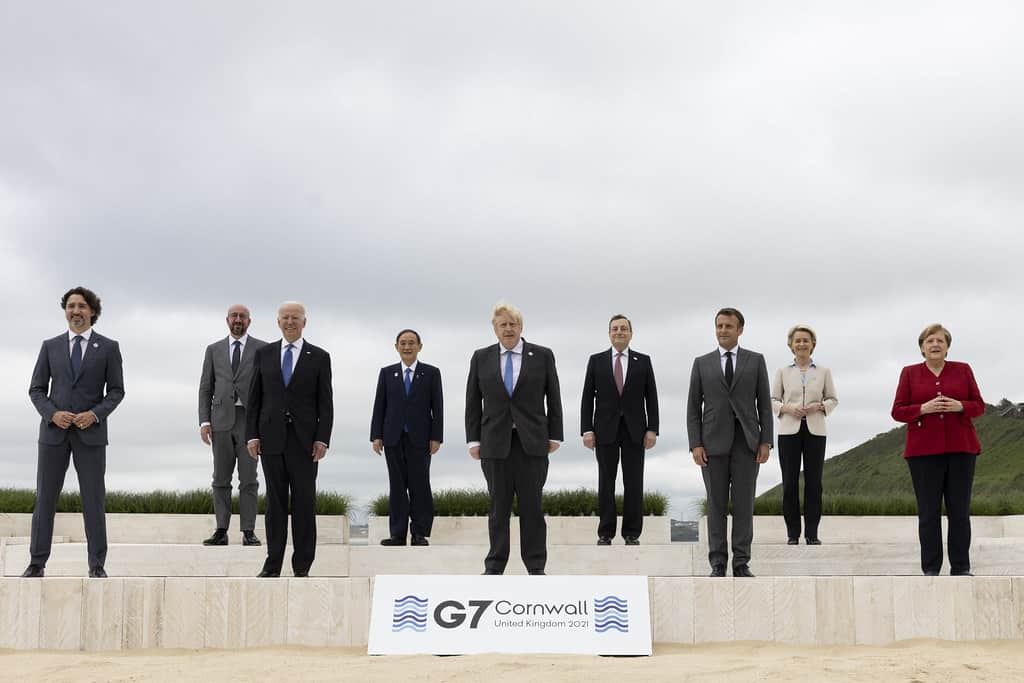
With the decline of Christianity, new faiths have sprouted in its place. The altars of previous beliefs are being rearranged.
At the G-7 summit concluded recently at Falmouth (U.K.), Great Britain genuflected yet again to the United States. Germany and France shared the same catechism. Their parent body–the E.U.–joined in the chants on behalf of its other absent 24 member states. Australia, India, South Korea and South Africa were invited to Falmouth to witness but not participate. China, Russia, the body of Africa, and the whole of South America found no place in that exclusive congregation.
At Falmouth, the tousle-haired British Prime Minister Boris Johnson used the G-7 gathering to revive the ‘special relationship’ between his country and its former colony, the United States. He sought a ‘new’ Atlantic Charter, to be signed between himself and US President Joe Biden with ink more permanent than the fading brine with which the original Atlantic Charter of 1941 had been inscribed.
That document was signed eighty years ago, on 14 August, between US president Franklin D. Roosevelt and British prime minister Winston S. Churchill, while the Second World War was still ongoing. Its aim, in summary, was to affirm that the U.S. and the U.K. nursed no territorial ambitions post-war, that every nation had the right of self-determination, that territorial re-alignments must be with the concurrence of the peoples affected, that trade barriers would be lowered, and that there would be disarmament (preferably universal) after the war.
In reality, the Charter tilted one way acknowledged the supremacy of the United States as the leader of the Free World. Tilted another way, it foretold the dismemberment of the British Empire. Through it, the U.S. forced the imperial octopus to chop off its own colonial tentacles. One beneficiary of that amputation was Pakistan, created exactly six years later, to the day.
Historians may detect a parallel with another such meeting of import – the Diet of Worms, held in 1521, five hundred years ago. Then, the Holy Roman Emperor Charles V sought to reassert his ‘special relationship’ with Pope Leo X by mobilising the Roman Catholic Church against Martin Luther’s challenges. As a result, the Pope’s authority over doctrinal matters stood reaffirmed; the Roman Catholic Church fell victim to the Reformation.
This ‘new’ Biden-Johnson Atlantic Charter must cause Brexiteers (even Nigel Farage) some discomfort. It is too obvious an obsequious affirmation of U.S.’s papacy.
Hidden in the small print of its xenophobic text is the West’s fear of ‘the peril of emerging technologies’ (i.e. China), its defensive determination to ‘oppose interference through disinformation or other malign influences, including in elections’ (i.e. Russia), and its resilience ‘against the full spectrum of modern threats, including cyber threats’ (i.e. from any malevolent hacker operating from anywhere in the borderless world of IT).
What PM Johnson could not do at Falmouth was to convert President Joe Biden. Biden is the second US president – after John F. Kennedy – who is an avowed Roman Catholic with Irish lineage. In 2015, Biden then VP acted as co-host to Pope Francis I. The following year, Biden visited Ireland. To Biden, the RC Church and Ireland are beads on his daily rosary.
It is interesting that in the U.S. – a potpourri of immigrants from almost every corner of the world – only two nations dominate its politics: Israel and Ireland. Not Italy which gave them its Mafia, nor Greece which inspired its public monuments. Not even Mexico, even when Mexicans constitute 25% of its immigrant population.
Unlike Jack Kennedy, Joe Biden has seen fit to remind 10 Downing Street that Northern Ireland is not a colony but geographically an integral part of the island of Ireland, just as Scotland and Wales are physically part of the British Isles.
This has touched a raw nerve in the British psyche. To them, Northern Ireland, Gibraltar, the Falkland Islands, even Hong Kong (returned to China almost twenty-five years ago), are inalienably British. To the rest of the world, however, they are dregs, left after the cup of empire had been drained.
If hamstrung giants like the U.K. cannot withstand U.S. pressure, what chance does a fingerling nation like Pakistan have? Our response to the US ongoing proposal to use Pakistan territory as a monitoring post will be a test of our much vaunted ‘sovereignty and territorial integrity’. We should, however, remember USAF-CIA Badaber base outside Peshawar from which U-2 aircraft flew across Russian airspace in the 1960s, recall Mr Bhutto’s offer to the U.S. in 1973 of a port in Balochistan, and our role as a profitable conduit to Afghanistan in the 1980s and thereafter. Nor should we forget Gwadar.
We sell our subservience too cheaply. Its cost converts poorly into U.S. dollars or Chinese renminbi.
Fakir S Aijazuddin is a noted thinker and columnist of Pakistan

